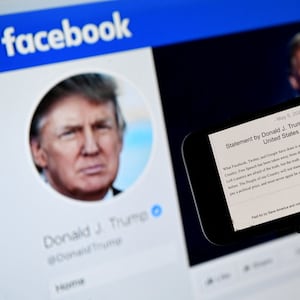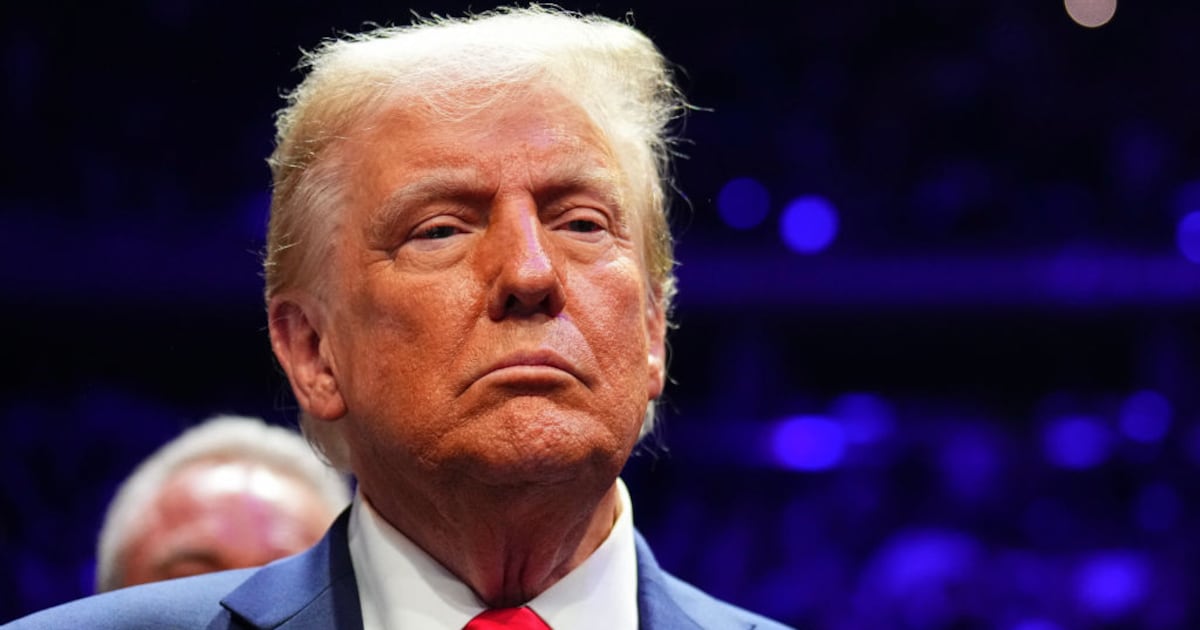After leaving office amidst economic devastation and high body counts, Donald Trump has now joined forces with conservative policy wonks, MAGA influencers, and a Florida travel agent who once told Cardi B to “shut up and twerk.” All of them are united by one common, conservative goal: using the court system to complain about how their social media posts keep getting taken down or how they keep losing Twitter followers unexpectedly.
The former president filed class-action lawsuits on Wednesday against Facebook, Twitter, and YouTube, months after he was booted from all three platforms for inciting violence in the wake of the Capitol riot.
The complaints demand that a federal court not only hand over punitive damages to the twice-impeached former president and reinstate his accounts, but that the court throw out Section 230 of the Communications Decency Act as “an unconstitutional delegation of authority.”
ADVERTISEMENT
Bizarrely, Trump’s attorneys argue that Facebook, Twitter, and YouTube are not private technology companies but rather arms of the federal government because they worked in cahoots with lawmakers and agencies like the CDC to formulate and enforce policies on misinformation. Their complaints claim the companies’ “status thus rises beyond that of a private company to that of a state actor” and that their content moderation decisions amount to the unlawful suppression of Trump and his co-defendants’ First Amendment rights when removing COVID- and election-related misinformation.
In a rambling press conference at his New Jersey golf club, Trump claimed it would “go down as the biggest class action ever filed because thousands of people want to join.”
But constitutional law experts almost laughed at the legal arguments presented in the suits.
“This lawsuit is a stunt and it’s unlikely to find traction in the courts,” Jameel Jaffer, executive director of the Knight First Amendment Institute at Columbia University, told The Daily Beast.
“The argument here that Facebook should be considered a state actor is not at all persuasive. It’s also difficult to square the arguments in the lawsuit with President Trump’s actions in office. The complaint argues that legislators coerced Facebook into censoring speech, but no government actor engaged in this kind of coercion more brazenly than Trump himself.”
One former Facebook official close to the company described the lawsuits to The Daily Beast as “a desperate fundraising appeal disguised as a lawsuit.” As if to prove the point, Trump’s political action committee swiftly began fundraising after the announcement, sending out a text blast that billed the lawsuits as a fight against censorship.
The co-plaintiffs on the three complaints include a number of conservative figures who pitched in on former Trump administration initiatives, assisted the Trump campaign, and joined Trump-aligned activist causes.
Kiyan and Bobby Michael, two co-plaintiffs in the Facebook suit, are “angel parents”—a term used by the Trump White House to refer to parents whose children had been killed by undocumented immigrants. Kiyan, who serves on the Black Voices for Trump advisory board, and Bobby, who is an advisory board member for Veterans for Trump, lost their son Brandon Randolph Michael in 2007 when an undocumented immigrant crashed into his car, killing him. The two claim that Facebook “censored” their “content relating to COVID-19 and support for President Donald Trump and his policies.”
Jennifer Horton, a Michigan elementary school teacher who participated in former First Lady Melania Trump’s “BE BEST” anti-bullying campaign, claims she was censored when posting information questioning the use of masks to prevent COVID-19 infections. She says the 24-hour suspension Facebook applied interfered with her ability to help find her brother who went missing in Tennessee and was later found dead.
Florida woman Elizabeth “Libby” Albert added her name to Trump’s Facebook suit and cited Facebook’s removal of the page for the #WalkAway Campaign, which encouraged users to “share their personal stories of why they decided to leave the Democrat party,” as an example of the supposedly unconstitutional censorship practiced by the company.
Albert serves as the executive director of the Walk Away Foundation. The Walk Away Foundation is a conservative nonprofit led by Brandon Straka, the group’s president, and Tracy Diaz, one of the earliest and most well-known Qanon influencers. Two days after the insurrection at the Capitol, Facebook removed Walk Away’s page and “banned the personal accounts of all page administrators and the business pages they managed,” according to Albert’s complaint.
Left unmentioned in the complaint is that Straka, the Walk Away Foundation’s president, was charged with impeding law enforcement, entering restricted grounds, and disorderly conduct with intent to disturb a hearing before Congress in connection with his alleged participation in the Capitol riots.
Linda Cuardros, a Miami resident who sued the city to block its mask mandate in June 2020, cited a temporary suspension for telling rapper Cardi B to “shut up and twerk” and the final removal of her account in 2020 for an unspecified “post about vaccines” as evidence of Twitter’s alleged censorship campaign.
The lawyers handling the class action suits for Trump and others are John Q. Kelly and John P. Coale, and the legal effort is backed by the American First Policy Institute, a think tank formed earlier this year by former Trump administration officials.
Conservatives incensed by social media companies’ moderation of COVID-19 and election misinformation, as well as racist and abusive content, have increasingly trained their ire on Section 230, which provides legal protections that shield social media companies from liability for the content users post.
Absent the immunity provided by Section 230, the broad scope of liability social media apps would be subject to would likely render them unable to function in their present form.
In Congress, pro-Trump lawmakers like Sen. Josh Hawley (R-MO) have attempted to exact similar punishment on tech companies via legislation that would repeal Section 230.
In support of the tech-as-government argument, Trump’s class action attorneys point to what they paint as the social media companies’ collusion with Democrats in Congress and the Biden administration over content issues.
They highlight Facebook, Twitter, and YouTube’s alleged work with the Centers for Disease Control and Prevention to highlight and promote verified information about COVID-19 prevention and treatment as well as pressure from Democratic members of Congress to remove content labeling COVID-19 as the “China virus” or referencing the “lab leak” theory, which claimed that the global pandemic began as a result of a leak at a virology lab in Wuhan, China.
The complaints, however, do not address whether tech companies’ moderation of other forms of prohibited content—including pornography on Facebook and YouTube or nation-state disinformation campaigns from Iran, Russia, and China—amounts to a similar violation of First Amendment freedoms in their reasoning.
Ari Cohn, a lawyer at the tech policy think tank TechFreedom, who examines how the First Amendment applies online, said the attempt to make social media companies into state actors is not new. (Trump’s twist, he said, was suggesting that Facebook had willfully participated in “joint activity” with the government and in “cooperation” with Democratic lawmakers).
“They know that they’re going to lose and this is a fundraising, publicity stunt that maybe lets them take a section 230 case up the appellate ladder,” Cohn told The Daily Beast.
Genevieve Lakier, a law professor at the University of Chicago, similarly told The Daily Beast in an email that the lawsuit “should be thought of mostly as a publicity stunt to detract from other stories,” namely the prosecution of the Trump Organization.
“I do think we should all be concerned when government officials threaten or cajole platforms in an effort to influence their content moderating decisionmaking,” she added. “I think, if you scrape away all the bad legal arguments in the complaint, there is a good point it is making—although one that I am sure the President is not committed to on principled grounds but merely based on his narrow self-interest.”
In addition to interfering with his role as the de-facto head of the Republican party and his ability to mount a 2024 presidential campaign, Trump’s lawyers say his ouster from social media has also “directly impacted [Trump’s] ability to communicate with family and friends.”
The American Conservative Union (ACU), where top Trump ally Matt Schlapp serves as chairman and Trump campaign attorney Cleta Mitchell sits on the board, signed on as a co-plaintiff in Trump’s suit against Twitter. Unlike Trump, the ACU doesn’t allege that Twitter censored its content but says that the organization lost over 10,000 followers from June 2020 and January 19, 2021 with “no indication from Twitter as to why followers were purged.”
As a matter of policy, Twitter does not generally offer users explanations of the rise and fall of their follower counts but shortly before Trump left office, Twitter removed 70,000 accounts associated with the QAnon conspiracy theory, which believes that Trump is at the forefront of a secret war with a global ring of elite Satanic pedophile cannibals.
Trump was completely banned from Twitter two days after the Capitol assault, effectively cutting him off from the more than 88 million followers he had accrued.
A Facebook-funded oversight board announced last month that the former president would be suspended from the platform for at least two years.
Both companies had made repeated concessions to Trump over the years. Facebook had exempted political figures like Trump from its hate-speech rules and enacted another policy not to fact-check political leaders in spite of Trump’s promotion of misinformation.










